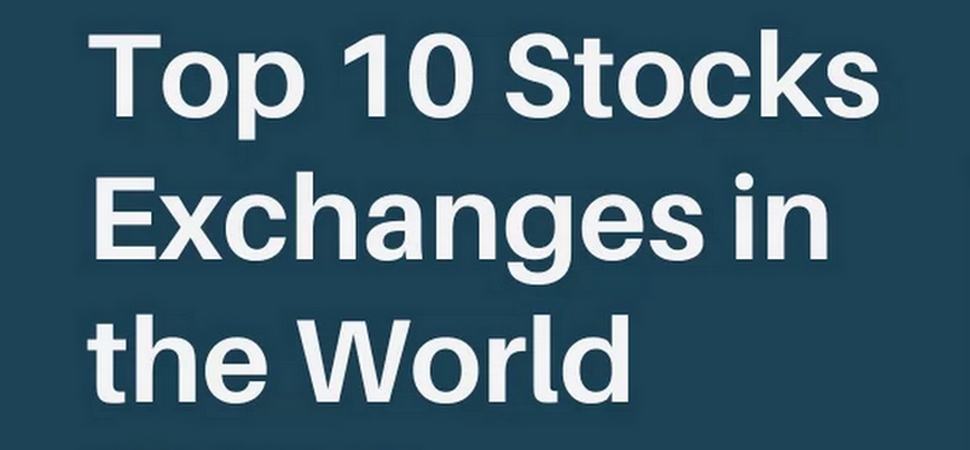30.10.2023
Евгений Лебедев
624

In the financial sector, according to their operations and development of activities, there is a small group of stock exchanges that are classified as the most important in the world according to their capitalization.
New York Stock Exchange (NYSE)
The New York Stock Exchange (NYSE) is located on Wall Street in New York City. It was founded in 1817, but did not begin trading under the NYSE name until 1963.
It has been the world's largest stock exchange by market capitalization since the end of World War I, when it overtook the London Stock Exchange.
In 2012, Intercontinental Exchange, a group of American futures exchanges, absorbed the NYSE.
There are more than 2,400 companies listed on the NYSE, representing industries such as finance, health care, consumer products and energy.
Some of the most prominent companies listed on the exchange include: Exxon Mobil Corp (XOM), Citigroup Inc (C) and Pfizer Inc (GE).
The most commonly used index is the Dow Jones index, as well as the SP&500 index.
NASDAQ
The NASDAQ stock exchange is also located in New York City, in the famous Times Square. It stands for National Association of Securities Dealers Automated Quotations and was founded by a group of local stockbrokers in 1971.
NASDAQ is notable for never operating on an open market system but always using computer or telephone trading systems, making it the first electronic stock exchange.
NASDAQ has the largest market capitalization among technology stocks. Some of the most significant companies listed on NASDAQ include Apple (APPL), Microsoft (MSFT), Facebook (FB), and Tesla (TSLA). The Nasdaq 100 index is used to measure the performance of the exchange.
Tokyo Stock Exchange
The Tokyo Stock Exchange (TSE), founded in 1878, is the largest stock exchange in Japan. After World War II, the TSE faced various problems and was even suspended from August 1945 to April 1949 due to the country's involvement in the war.
In 1949, it was renamed and is now known under the name of its owner, Japan Exchange Group. The group was formed by the merger of the Osaka Stock Exchange and the TSE in 2013.
It has more than 3,575 listed companies and contributes to the market capitalization of the TSE. The most representative benchmark index is the Nikkei 225, with Honda Motor Co, Toyota Motor Corp and Sony Corp among the most important companies.
Shanghai Stock Exchange (SSE)
The Shanghai Stock Exchange (SSE) is one of three independent stock exchanges in the People's Republic of China.
The Shanghai Stock Exchange is the fourth largest stock exchange in the world, despite the fact that it was founded recently, in 1990. Although it actually dates back to 1866, it was suspended in 1949 due to the Chinese Revolution.
Investors monetize the performance of stocks listed on the Shanghai Stock Exchange through the SSE Composite Index, also known as the Shanghai Composite.
It includes major Shanghai Stock Exchange stocks such as PetroChina, Industrial and Commercial Bank of China and Agricultural Bank of China.
Hong Kong Stock Exchange (Hong Kong Stock Exchange)
The Hong Kong Stock Exchange (SEHK) was founded in 1891 by the Hong Kong Stockbrokers' Association.
SEHK is one of the three stock exchanges in China, however, the SEHK trading floor closed in 2017 due to the transition to electronic trading.
The Hong Kong Stock Exchange is the third largest stock exchange in Asia. It operates in Hong Kong dollars (HKD) as listed companies are predominantly based in Hong Kong.
There are 1,955 listed companies, and most of the exchange's market capitalization comes from the top 20 stocks, including AIA, Tencent Holdings and HBSC Holdings.
London Stock Exchange
The London Stock Exchange (LSE) was founded in 1801, but its history dates back to 1698, when the LSE's services were limited to publishing market prices every two weeks.
This makes it one of the oldest stock exchanges in the world.
In fact, it was the most significant stock exchange in the world until after World War I, when it was superseded by the New York Stock Exchange. Today, the LSE is the sixth largest stock exchange in the world and the largest in Europe.
Investors can track the performance and market capitalization of the LSE through the Financial Times Stock Exchange 100 Index or FTSE 100. This index includes the 100 largest companies listed on the London Stock Exchange, including Barclays, BP and GlaxoSmithKline.
There are other indices that can be used to track companies listed on the London Stock Exchange, such as the FTSE 250, FTSE Small Caps and FTSE All-Share.
Euronext
This exchange is based in Amsterdam, Netherlands, but is pan-European and covers the Netherlands, Portugal, Belgium, France, Ireland and the UK. It was founded in 2000 to represent the European economy as a whole and therefore trades in euros.
In 2007, Euronext merged with the NYSE Group to form NYSE Euronext and in 2013 it was fully absorbed by Intercontinental Exchange.
Then, in June 2014, Euronext went public to become an independent company again, this exchange is the seventh largest in the world.
Since several countries participate, the exchange has 1,300 listed companies and 30 stock indices that can be used to monetize their performance. However, the dominant index for Euronext-listed companies is the Euronext 100, which consists of the most important and liquid Euronext stocks such as AXA, Christian Dior and Renault.
Shenzhen Stock Exchange (Shenzhen Stock Exchange)
The Shenzhen Stock Exchange (SZSE) is the third largest stock exchange in the People's Republic of China. Although it was founded in 1987, it officially began trading in 1990.
The SZSE is a self-regulatory organization, but is supervised by the China Securities Regulatory Commission (CSRC).
Quotes on the SZSE are quoted in Chinese yuan, as its member companies are mainly based in China. The Shenzhen Stock Exchange is also home to the SME Board, which was created in 2004 for companies in the manufacturing sector, and the ChiNext Board, which was launched in 2009 to emulate NASDAQ's approach to technology startups.
Toronto Stock Exchange
The Toronto Stock Exchange (TSK) was founded in 1852. It has more than 1,500 listed companies and is Canada's largest stock exchange.
In 2009, the TSX merged with the Montreal Stock Exchange, resulting in the parent company's name changing from TSX Group to TMX Group.
In 2011, TMX Group attempted to trade with the London Stock Exchange, but these negotiations were unsuccessful as shareholder approval was not obtained.
The Toronto TSX is the third largest stock exchange in North America. Some of the largest companies listed on the Toronto Stock Exchange include Royal Bank of Canada and Suncor Energy Inc.
The 100 largest companies on the TSX can be tracked by the S&P/TSX Composite index, which accounts for about 70% of the market capitalization of the Toronto Stock Exchange.
Frankfurt Stock Exchange (Deutsche Boerse)
The Frankfurt Stock Exchange (FWB) was founded in 1585 to fix currency exchange rates, but over the centuries it came to be regarded as one of the world's first stock exchanges, along with London and Paris. After World War II, it established itself as the most important German stock exchange.
It is the most important stock exchange in Germany and the leading European exchange in terms of market capitalization. Its DAX-XETRA index is regarded as a benchmark by international analysts.
